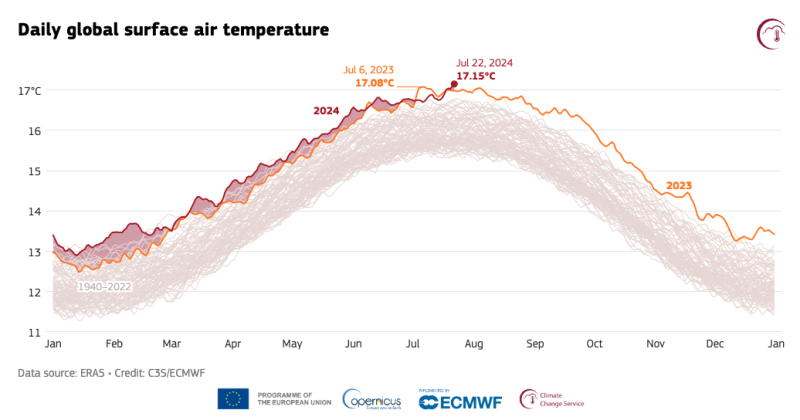Monday Broke Sunday’s Record as the Hottest Day on Earth

Depositphotos
Earth experienced its hottest day on record twice this week. According to data from the Copernicus Climate Change Service (C3S), Sunday initially set the record for the highest global average temperature since records began in 1940, only for Monday to surpass it.
On Sunday, July 21, the global average surface air temperature reached 17.09 °C (62.76 °F), just surpassing the previous record of 17.08 °C (62.74 °F) set on July 6 last year. However, this record was short-lived, as the temperature climbed to 17.15 °C (62.87 °F) on Monday, July 22.
Data Source and Variability
It’s important to note that these findings are based on preliminary data from the ERA5 dataset, collected by the C3S as part of the European Union’s Copernicus program. Differences between datasets, some of which have recorded even higher temperatures, arise from variations in data collection locations and processing methods.
Despite these differences, datasets generally agree on broader trends, showing a long-term rise in average temperatures, with 2023 and 2024 leading significantly.
For example, before last July, the highest daily average temperature record was 16.8 °C (62.24 °F), set on August 13, 2016. However, since mid-2023, this record has been broken nearly 60 times.
Unprecedented Temperature Records
“This new record of daily global average temperature is noteworthy because it occurred outside of an El Niño warm phase during an extended period of extraordinary heat. June 2024 marked the thirteenth consecutive month of record-breaking global temperatures,” said Chris Hewitt, Director of Climate Services at the World Meteorological Organization (WMO).

C3S/ECMWF
Unsurprisingly, 2024 is on track to potentially become the hottest year on record, a title currently held by 2023
Unsurprisingly, 2024 is on track to potentially become the hottest year on record, a title currently held by 2023. The first half of this year has consistently been warmer than the same period last year. However, the last four months of 2023 were so unusually warm that it’s uncertain if 2024 will surpass it, especially with a La Niña phase likely. Regardless, this year is expected to comfortably rank in the top 5.
“What is truly staggering is how large the difference is between the temperature of the last 13 months and the previous records,” said Carlo Buontempo, C3S Director. “We are now in truly uncharted territory, and as the climate keeps warming, we are bound to see new records being broken in future months and years.”
To address a common argument: yes, Earth has been much hotter in the past, and the climate has changed drastically many times before. That’s why these findings are always stated in terms like “on record.”
Long-term studies suggest we may not have seen sustained periods of temperatures this high in around 125,000 years, and rapid climate change often leads to mass extinctions, as we’re beginning to see now.
Life on Earth is remarkably resilient, and some form of it will likely persist until the Sun explodes. However, it would be beneficial if we could ensure humans stick around a bit longer.
Read the original article on: New Atlas
Read more: China Aims to Deflect a Near-Earth Asteroid by 2030










